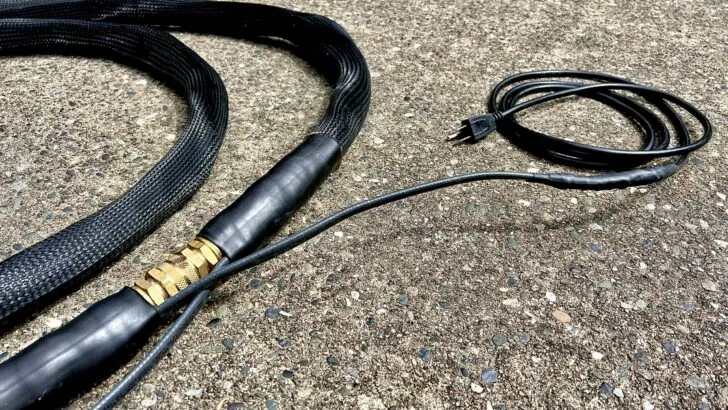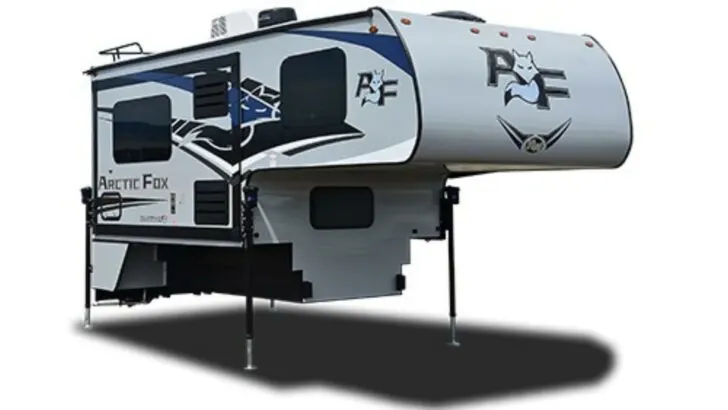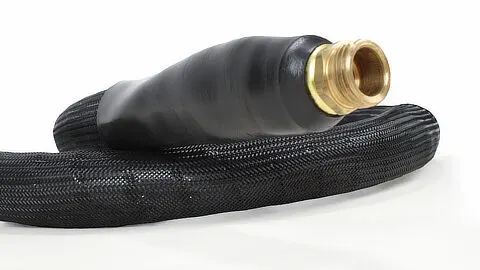Is there any such thing as a 4 season RV? We’re writing this as September winds down and the temperatures are dropping steadily in many places. Some people are looking back at our post on RV winterizing tips and getting ready for the inevitable task. But is there a 4 season motorhome (or other class of camper) for those among us who want to RV in all camping seasons?
Today we’re looking at the prospect of 4 season RVs — rigs that allow for comfortable camping in most all weather conditions. We’re talking about RVs that can accommodate freezing temperatures without causing damage to holding tanks, solar panels, windows, etc., and heating systems that make cold weather camping comfortable for RV living.
Do they exist? Let’s find out!
Can’t Any Camper Be a 4-Season RV?
Well…sort of. Many of us who are full-timers or diehard RVers have developed ways of RVing in all seasons.
By “sort of” what we mean is that we’ve come to terms with occasionally camping in somewhat harsh weather conditions (especially the cold) by making accommodations within the scope of the 3-season RVs we actually have.
For example, you may have seen our tips for winter RV living or our post entitled “Winter RVing in Freezing Weather — Cold Climate RV Survival Tips“.
We’ve talked about RV skirting for winter, RV tank heating pads, and heated RV water hoses. We even went through the trouble of creating and documenting a DIY plan to keep our RV water hose from freezing by using heat tape for RV water hoses. (Of course, you can also buy a No Freeze Water Hose at a special discount rather than make your own.)
Heck – we even installed a dedicated power outlet for winter camping. So you can see that winter RVing is a big topic with lots to cover.
Some RVs may have dual pane windows and fairly decent insulation which can help with chilly weather and even short-term winter camping. But for extreme weather or longer-term winter camping, special accommodations would need to be made.
And yeah – we’ve done our share of winter camping and we’ve got the receipts to prove it:
The truth is that many of us are snowbirds for the most part with an occasional winter camping trip. But there are those hardy winter souls who love to ski and snowboard and go to considerable extremes to be able to camp in cold weather.
We’re not saying we’ve never been caught in extreme winter conditions. We have. We were prepared so we didn’t die of hypothermia, but we do suggest that maybe owning a 4 season motorhome would have been simpler.
What Is a 4 Season RV?
To be clear from the start, the RV industry has no specific standards that apply to “4-season RV” specifications. At most, the term “4-season RV” is a marketing term.
That said, a true 4-season RV would, in practice, need to be able to withstand all seasonal climates including some fairly extreme heat (above 100°F) and cold (below freezing) for extended periods.
This may sound simple, but it would require a number of features beyond strong AC and heating systems.
Maximum Insulation
A 4-season RV would need to be constructed with a high R-value for maximum insulation from both the heat and the cold.
Dual-Pane Windows
Again for maximum heat and cold resistance, double-pane windows would be necessary throughout a 4 season travel trailer or 4 season motorhome.
Dual-pane windows also help to keep condensation at bay to the greatest extent possible. Keeping moisture down is very important in an RV environment to prevent the formation of mold and mildew.
Heated Basement Compartments
A true 4-season rig would require heated basement compartments not only to protect whatever is stored down there, but also to contribute to the warmth and insulation of the RV’s living area. And of course, the basement often contains an RV’s fresh water and waste holding tanks, so keeping them above freezing is crucial.
Battery Protection
Batteries would need to be protected because cold weather impacts the lives of both lithium and lead-acid batteries. Some batteries (AGM and lithium) may be safely installed in a heated living area. Others (some lithium models) are self-heating. Either way, batteries should not be allowed to freeze.
High BTU AC and Furnace
The output of the air conditioner and furnace of a 4-season RV would need to be as highly rated as possible for use in extreme temperatures.
(Pro Tip: A high-BTU diesel heater might be an option for cold weather as they tend to heat quickly.)
Plumbing and Holding Tanks
When designing a true 4-season motorhome or travel trailer, careful thought would need to be given to the placement of the plumbing and holding tanks to keep them from freezing.
In addition, heated holding tanks or RV tank heating pads can be used. The RV’s plumbing system also needs to be routesd through the interior of the RV for the least exposure to cold.
Heated Water Hose
Things like heated RV water hoses would be necessary for 4-season RVs as well. As mentioned earlier, you can buy a No Freeze Water Hose at a special discount if you’d prefer to have the highest-rated freeze protection available.

We used to use a DIY heated water hose, but we’ve upgraded to a No Freeze Water Hose for the ultimate freeze protection. They’re more expensive than the DIY route, but they’re incredibly well-made and robust.
Floor Plans
Floor plans are best designed with temperature extremes in mind. This might be more challenging in a small Class B RV or in truck campers with limited space and more limited design and layout options. Slide-outs can also equal more surfaces being exposed to cold temperatures.
Are There Any 4-Season RVs?
There are RVs that are marketed as 4-season RVs. Remember – the term “4-season” is really a marketing term.
If you see a rig marketed as a 4-season motorhome, travel trailer, 5th wheel, or truck camper, you’ll want to check the specs to see exactly what the manufacturer has done to prepare the rig for 4-season camping. Check R-values in walls, floor, and ceiling, the availability of tank heaters, plumbing insulation, etc.
Among the most popular rigs billed as 4-season RVs are the Arctic Fox campers. These are travel trailers, fifth wheels, and truck campers made by Northwood Manufacturing.

This Arctic Fox truck camper is an example of a rig that is marketed as a “4-season RV” based on features provided by the manufacturer. (Photo credit: Northwood Manufacturing)
Arctic Fox rigs use rigid foam, batten, and reflective foil insulation for protection from heat and cold. With heated holding tanks in fully insulated enclosures and enclosed knife valves, these RVs are marketed to be fully capable of comfortable 4-season living.
But are these truly 4-season RVs?
Well, that really depends on where and how you camp which is the real bottom line when determining the true value of the “4-season” marketing term.
Are You a 4-Season RVer?
We’re always interested in hearing how other RVers manage their 4-season camping and RV living experiences. Drop us a comment below. We’d love to know how you camp in all four seasons!
Geek Out with Us Every Week
Join our newsletter to learn about all things RV-related. Every week we offer free tips, tricks, product reviews, and more to our online community of RVers. So, whether this is your first time on the road or you’re a seasoned expert, we’d love for you to geek out with us!



Dennis O Johnson
Friday 29th of September 2023
My wife and I live in northern Minnesota and have winter camped for many years, especially in state parks that stay open during the winter for cross country skiing, snowshoeing, and other winter activities.
We had a double pane window Mountain Air which did simplify things, including two air conditioners that could be used as a source of heat. Between the comments mentioned below, as long as we had a plug-in we could be quite comfortable
However our newer 30 ft Winnebago Vista does not have double pane windows and is not outfitted for winter camping. We still have continued to enjoy cold weather camping with a number of adjustments.
The first is to forget the use of our furnace. It burns fuel too quickly and distributes the heat throughout the entire RV when we only need it in a portion. So we adapted by using a small Buddy heating system with a propane tank in the shower and the Buddy sitting in the hallway. During the daytime it is facing the living area and kitchen. At night it faces the bedroom. We have always been comfortable using this adaptation. I know some people would object to using propane tank in the interior. However the propane tanks today and the newer buddies system have so many safety features that we have never had a problem. And as a catalytic type heeter, we vent but not as much as if we had a regular open flame inside the coach.
Also forget about using water in the kitchen sink, toilet and shower. Instead we have gallons of freshwater in jugs available to use in the kitchen. You can get by with only using a very limited amount of water to wash and clean up.
We also use a mixture of RV antifreeze and window washer fluid to flush the toilet. This keeps the toilet "water" liquid down to extremely. The liquid stays at least slushy or better so that the black water tank can be emptied even at low temperatures.
Finally we keep the windows, which are not double pane, reasonably warm by using our pull-down shades. They actually prevent a lot of cold air encroachment. We also put a blanket or divider of some type behind the driving area. This also keeps the cold from the massive front windows from encroaching on the living quarters. No need to heat that area as well.
With these adaptations, we have always managed to stay comfortable at least in the '60s. And here in northern Minnesota, we love and even prefer living in the sixties at times.
I hope this is useful, even though we no longer do a lot of cold weather camping now that we are in our late seventies. We go south for the warmer climates during winter. But these adaptations worked well for us for many years.
TheRVgeeks
Tuesday 3rd of October 2023
Sounds like you really perfected your system, Dennis! Thanks for sharing the details... and hope you keep enjoying those warm snowbird winters! 😉
Amy Turner
Friday 7th of July 2023
I'm looking to live full time in a travel trailer in western pa where the temperature drops below freezing fairly often in the winter. I realize the term four-season doesn't necessarily mean that it can withstand those low temperatures. I am primarily looking at ones with a heated and enclosed underbelly, heated water tanks and 30 BTU. I plan to get window insulation and heated water hose (hooking up to residential sewer, clean water and electric). Am I out of my mind? I'm looking at arctic fox (hard to find), keystone, grand design. Please tell me this is doable
TheRVgeeks
Saturday 8th of July 2023
Hi Amy. No, you're not out of your mind. Wintering in an RV is totally possible... it just may not be all that pleasant at times. Draftier then a sticks and bricks. You have to manage humidity to keep mold/mildew from forming and becoming a problem (especially in the walls in places you can't see), etc. But none of it is insurmountable.
The brands you've identified are all good, and should have sufficient insulation to help keep you comfortable. Another brand to try looking for (though, like Arctic Fox, may be hard to find) is Outdoors RV. They're built to withstand the temperature extremes of the Western Mountains, so they have good insulation and enclosed underbellies, too.
One thing you'll likely want to plan for to help keep you warmer and more comfortable in the cold would be to skirt the RV. If you're not planning to move it (much or at all), putting anything around the base of the trailer to block wind and cold from blowing underneath will help keep you warmer inside. Vinyl fabric is commonly used... you can install stainless steel snaps to attach it with. Or, in a pinch, you can use bales of hay (though that can attract rodents) or even pile up SNOW! Or, if budget's not an issue, you could get inflatable skirting: Inflatable RV Skirting: The Easiest Way to Skirt Your RV!
Don
Friday 30th of September 2022
Do you recommend using a trailer cover when storing trailer outside for the winter ?
TheRVgeeks
Saturday 1st of October 2022
Hi Don... good question. Yes, we do recommend covering an RV when it's stored! You can check out our two articles on the subject: The Pros & Cons of RV Covers and then 5 Best RV Covers to Protect Your RV. Hope that helps you decide!
John S.
Friday 30th of September 2022
During my working life I travelled to northern Canada a lot and when planning retirement one goal was to get a comfortable RV and go travelling. One priority was to show Kathy Aurora Village (north of Yellowknife) in January and get some great northern light photos.
Well, I did retire and we did get a really comfortable coach. In fact our Newmar was made for Canadian registration and included a lot of the '4-season' features you mention.
But after being in temperatures that are five to eight degrees below freezing I have changed my mind on taking the rig to Yellowknife in January where it can often get thirty degrees below.
As you point out, and I'll underline, the term “4-season RV” is a marketing term.
John
Friday 30th of September 2022
Earthroamer suggests their RVs are four season capable. And they might be...for a price.
That said, I kinda want one, but DW says we'll opt for a Newmar. :-)